
Topics
Guests
- Raed Jarrarblogger and political analyst. He is the Iraq consultant for the American Friends Service Committee.
- Dahr Jamailan independent journalist who has reported from Iraq extensively since the US invasion of 2003. He publishes his reports on a blog called DahrJamailIraq.com. He is author of Beyond the Green Zone: Dispatches from an Unembedded Journalist in Occupied Iraq.
In his final state of the union, President Bush once again defended the Iraq invasion and claimed the so-called troop surge a success. Bush also repeated his threatening rhetoric against Iran. We speak with unembedded journalist Dahr Jamail and Iraqi blogger Raed Jarrar. [includes rush transcript]
Transcript
AMY GOODMAN: As we continue our State of the Union coverage, I want to turn now to Iraq. President Bush used his speech to proclaim success in the massive expansion of the US occupation that he announced a year ago.
PRESIDENT GEORGE W. BUSH: While the enemy is still dangerous and more work remains, the American and Iraqi surges have achieved results few of us could have imagined just one year ago.
When we met last year, many said that containing the violence was impossible. A year later, high-profile terrorist attacks are down, civilian deaths are down, and sectarian killings are down.
When we met last year, militia extremists, some armed and trained by Iran, were wreaking havoc in large areas of Iraq. A year later, Coalition and Iraqi forces have killed or captured hundreds of militia fighters. And Iraqis of all backgrounds increasingly realize that defeating these militia fighters is critical to the future of their country.
When we met last year, al-Qaeda had sanctuaries in many areas of Iraq, and their leaders had just offered American forces safe passage out of the country. Today, it is al-Qaeda that is searching for safe passage. They have been driven from many of the strongholds they once held, and over the past year, we’ve captured or killed thousands of extremists in Iraq, including hundreds of key al-Qaeda leaders and operatives. Last month, Osama bin Laden released a tape in which he railed against Iraqi tribal leaders who have turned on al-Qaeda and admitted that Coalition forces are growing stronger in Iraq.
Ladies and gentlemen, some may deny the surge is working, but among the terrorists there is no doubt. Al-Qaeda is on the run in Iraq, and this enemy will be defeated.
AMY GOODMAN: For more on Iraq, I’m joined now by two guests here in New York: Dahr Jamail, independent journalist, reported from Iraq extensively since the US invasion of 2003, publishes his reports on a blog called dahrjamailiraq.com, author of Beyond the Green Zone: Dispatches from an Unembedded Journalist in Occupied Iraq; and joining me in Washington, D.C., Raed Jarrar, Iraqi blogger, political analyst, his blog, “Raed in the Middle,” is at raedinthemiddle.blogspot.com, Iraq consultant for the American Friend Service Committee.
Let’s begin with you, Raed. Your response to President Bush’s last State of the Union, when it comes to Iraq and Iran?
RAED JARRAR: I didn’t see anything new in the President’s address. It seems like a continuation of the US foreign policy that is based on intervention and militarism and a continuation of the US strategy in Iraq that now has been proven that nothing will change it. When the situation — when the number of casualties is higher, there is one reason that is given to the public: to continue staying in Iraq and to leave permanent bases. When the number of casualties is lower, there is another reason that is given to the public: to leave permanent bases in Iraq and to continue the occupation. So whatever the condition on the ground was, whatever the reaction from the Iraq public was, this administration’s foreign policy is exactly the same; it does not change based on realities or fact. So I didn’t see anything new in that.
And we did not see anything new on Iran, as well. We saw the same threats, despite the recent report showing that Iran stopped its nuclear weapons program since the year 2003. We heard exactly the same rhetoric, because, as I mentioned, the strategies of this administration will not be changed by the realities. And these excuses that they give will change from time to time. They just try to address the public opinion and change the different excuses to maintain the same interventionist foreign policy.
AMY GOODMAN: Dahr Jamail, it’s pretty much universally accepted in the corporate media, the surge has worked. We speak just after five US soldiers were killed in Mosul, but what about that?
DAHR JAMAIL: Well, the surge — and what’s very interesting, too, is not only do we have a US surge, according to Mr. Bush, we have an Iraqi surge — two Iraqi surges, actually, the first of which he mentioned in his talk last night, the concerned citizens or the awakening groups. Well, it’s really interesting that the same time last year, as Mr. Bush was happily doing during his speech, comparing where were we last year to this year, well, last year, these same people, these concerned local citizens, according to the US military, were called al-Qaeda or insurgents or terrorists. And now that there’s 80,000 of them on the US payroll, they’re concerned citizens and they’re an Iraqi surge. And these same people, as we look at the situation on the ground, this is causing deep, deep — a deepening of the political divisions in the country. The US-backed Prime Minister Nouri al-Maliki has been vehemently opposed to this concerned citizens group backed by the US military in Iraq, these people, most of which are former resistance fighters, because they’re now a threat to the Iraqi government forces. So that’s causing huge problems on the ground in Iraq today.
And if we look at the situation, the military recently announced within the last month that there was a sevenfold increase in the use of air power last year. So these are some of the reasons why right now there are fewer US troops dying, but the reality is they’re paying off resistance fighters to stand down. And Muqtada al-Sadr, who commands the largest militia in the country, has his militia on stand-down until next month, where that stand-down might end and things would change dramatically.
AMY GOODMAN: And why are they standing down now?
DAHR JAMAIL: He put them on stand-down almost six months ago to basically re-vet people coming in. His militia had been infiltrated by what he called foreign elements. There were people posing as militiamen going out and committing atrocities, etc. And I think there are other political reasons, obviously, as well, why it’s on stand-down. But that’s about to end.
AMY GOODMAN: Raed Jarrar explain who these people are who are on the US payroll, these citizens’ groups, militias.
RAED JARRAR: The new citizens from Al Anbar and other provinces in the west and middle of Iraq is nothing new. The US has trained and supported private militias and governmental militias during the last few years, mostly from the Shiites and from the Kurds. So there were Shiite and Kurdish militias, either working as a part of the governmental forces or independently from the governmental forces, who have been trained and funded and supported and protected by the US forces in Iraq during the last few years. Now, the US added a new sectarian force that is mainly Sunni to its payroll, a new sectarian militia. So now we have three major sectarian militias — Sunni, Shiite and Kurdish militias — that are trained and funded by the US, whether they were inside or outside the government. And these three major militias are actually a part of a bigger US policy of supporting sectarian leaders in Iraq, who are sectarianly and ethnically cleansing the country and cutting it and partitioning it demographically.
Now, the new group of tribal leaders who allied themselves with the US, their numbers may reach to up to 70,000 or 80,000 mercenaries or private militias. They will not change this US foreign policy in Iraq or the US policy in Iraq of supporting a minority of Iraqis, whether they were Sunnis or Shiites or Kurds, against the majority of other Sunnis, other Shiites and other Kurds, who are nationalists, who are for keeping the country united and ending any type of foreign intervention. So there is nothing new about the support, other than finding new partners in Al Anbar who are willing to take US governmental money and oppress and kill their own people, you know, and support the foreign powers. So If this policy continues, we will continue seeing the number of Iraqi internally displaced people increasing and the ongoing project of splitting Iraq into three confederations, going — you know, funded with US taxpayers’ money and with US protection in Iraq.
AMY GOODMAN: Dahr Jamail, the presidential candidates and their views on Iraq? Today is the Florida primary for the Republicans. John Mccain saying we could be there for a hundred years and going after Governor Romney for at one point suggesting, though Romney fiercely denies this, that maybe there should be a timetable.
DAHR JAMAIL: There is nothing in US policy to indicate that there is going to be any change in the policy in Iraq, meaning total immediate withdrawal or even a relatively gradual withdrawal. When we look at either Republican or Democratic mainstream presidential candidates, there’s nobody out there that’s in favor of this. Nobody is talking about this. I mean, it’s a very interesting phenomena, where, of course — Bush, of course, not mentioning it last night either.
But we just have to look at the hard facts on the ground. There are right now between six and twelve permanent US military bases either constructed or being constructed. We have the largest embassy on the planet in Baghdad that’s two-thirds the area of the National Mall in Washington, D.C.
We have all this rhetoric coming up: well, in March, we’re going to start this troop withdrawal. And yet, in recent weeks, Bush himself has said, no, that’s probably not going happen. We’re going to leave it — or rather, he said we’re going to leave that up to the generals. And two nights ago, when interviewed by Wolf Blitzer on CNN, General Petraeus would not talk about withdrawal. He would — he continually deferred to his statement of, well, we’re going to just have to monitor the situation on the ground, and depending on if it improves, we might bring some troops home. And he mentioned bringing home one or two divisions already. But in reality, we have between 160,000 and 170,000 US military personnel in Iraq right now. It’s right at the highest level it’s been through the entire occupation. And we have an even greater number of American paid contractors working in Iraq, not just mercenaries, but overall contractors that actually outnumber the US military personnel in Iraq. And there’s nothing to indicate that there is going to be much change at all of bringing any of these people outside of the country, as we come up on the five-year anniversary of the occupation.
AMY GOODMAN: I’m talking to Dahr Jamail — his book is called Beyond the Green Zone: Dispatches From an Unembedded Journalist in Occupied Iraq — and Raed Jarrar, blogger and political analyst. He came to the United States from Iraq about a decade ago and continually writes about his own country. He works with the American Friends Service Committee.
[break]
AMY GOODMAN: Our guests are Dahr Jamail, author of Beyond the Green Zone, and Raed Jarrar, Iraqi blogger, political analyst, is a consultant for the American Friends Service Committee. I want to go to the issue of Iran. Last night, President Bush repeated his threatening rhetoric against Iran, vowing to confront those who challenge what he called, quote, “our vital interests in the Persian Gulf.” He reiterated his longstanding refusal to negotiate unless Iran first shuts down its nuclear activities.
PRESIDENT GEORGE W. BUSH: We are also standing against the forces of extremism embodied by the regime in Tehran. Iran’s rulers oppress a good and talented people. And wherever freedom advances in the Middle East, it seems the Iranian regime is there to oppose it. Iran is funding and training militia groups in Iraq, supporting Hezbollah terrorists in Lebanon, and backing Hamas’s efforts to undermine peace in the Holy Land. Tehran is also developing ballistic missiles of increasing range and continues to develop its capability to enrich uranium, which could be used to create a nuclear weapon.
Our message to the people of Iran is clear: we have no quarrel with you, we respect your traditions and your history, we look forward to the day when you have your freedom. Our message to the leaders of Iran is also clear: verifiably suspend your nuclear enrichment so negotiations can begin; and to rejoin the community of nations, come clean about your nuclear intentions and past actions, stop your oppression at home, cease your support for terror abroad. But, above all, know this: America will confront those who threaten our troops, we will stand by our allies, and we will defend our vital interests in the Persian Gulf.
AMY GOODMAN: President Bush in his last State of the Union last night in Washington, D.C. Raed Jarrar, it almost sounded like he did a find-and-replace on the word “Iraq” from three years ago and inserted “Iran.”
RAED JARRAR: I completely agree, because it’s the same policy. Iraq is nothing more than a symptom of this interventionist policy that is based on sending troops to occupy and control countries around the region and the world. I think at the same time that President Bush thinks that his message is clear to the Iranian government and the Iranian people, I think we are going through a time where the message of the Iranian people and the other people from the region to the US government is clear, as well. People are saying we are better off without your intervention. We are better off. We know how to self-rule ourselves. If we need to change our government, we will change them from inside, from within, especially after what happened in Iraq. Iraq is an example of how the US intervention to change regimes have destroyed the country completely, at the same time that Iraqis changed their political regimes in the last eighty years ago, I think seven or eight times without destroying their country. So I think there are clear messages that are being sent to the US government by the people of the region, whether they were Palestinians or Iranians or Iraqis or Syrians or whatever in the region, that we are better off without your intervention. We are better off without you trying to, quote-unquote, “help us” get our freedoms or whatever the excuse is used to bomb other countries in the region.
AMY GOODMAN: Dahr Jamail, finally, the issue for Iraqis on the ground every day?
DAHR JAMAIL: We need to be really clear in the frame of the situation. We’re looking at a situation where even according to the former UN leader Kofi Annan, who said this invasion violated the Geneva Conventions, and the reality on the ground now, how that translates for the Iraqi people coming up on the five- year anniversary. We’re looking at over a million dead Iraqis, according to the conservative, as they’ve been told to me, by a UNHCR spokesperson in Syria last summer, that they — admitting that their figures for displaced people are conservative. And those conservative figures are 4.5 million displaced Iraqis, in addition to, according to an Oxfam International report last July, another four million in dire need of emergency aid. When we add those up, taking into consideration of the fact that Iraq’s overall population has dropped, when you have two-and-a-half million people leave the country and another million people killed, it’s dropped from twenty-seven down to probably twenty-four million or twenty-five million people. And when we add those numbers up, we’re looking at — we’re getting close to half the total population of the country have either been displaced from their homes. One-in-four people in Baghdad alone are displaced from their homes or in need of emergency aid or are dead. So we need to be really clear about the fact that Mr. Bush is a war criminal, and there’s countless other war criminals in his — this administration and his previous administration. And the situation on the ground for Iraqis is a complete catastrophe. Their country has been eviscerated. There is no normal life, and there’s no end in sight.
AMY GOODMAN: I want to thank you, Dahr Jamail, for being with us. Beyond the Green Zone: Dispatches from an Unembedded Journalist in Occupied Iraq is his book. Raed Jarrar, blogger and political analyst, he is the Iraq consultant for the American Friends Service Committee.

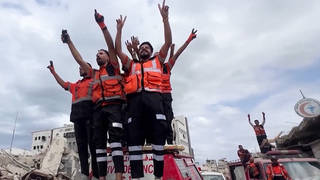
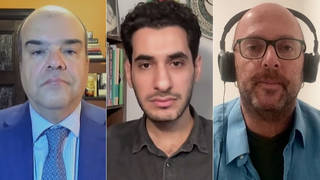
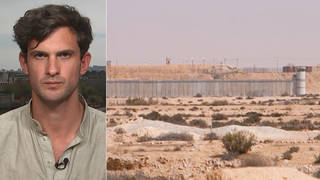
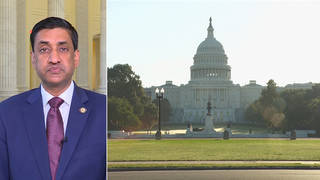





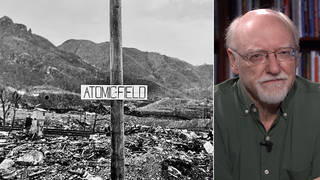
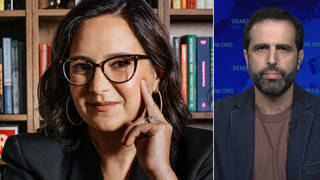
Media Options